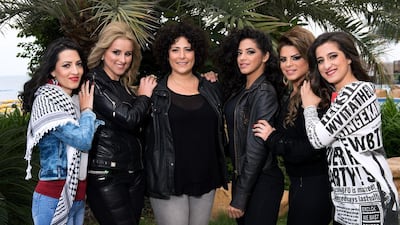The Ajyal Youth Film Festival opened in Doha's Katara Village with the pulsating documentary Speed Sisters, about the first all-women rally-racing team in the Arab world.
The film is directed by Amber Fares, who grew up in northern Alberta as the child of Lebanese immigrants. After 9/11, when mosques started being attacked in Canada, Fares wanted to better understand Arab culture so went to the Middle East.
Her first stop was Lebanon, before she went to work in Ramallah. Speaking at the Ajyal film festival, she recalls: “I heard about the races and saw that there were some women racing. I think, for me, like anyone else, the idea of there being speed tests in the West Bank was kind of a cool thing anyway and then there was the fact that there were women competing against men – and that sort of blew me away. It’s one of those stories that is so shocking because it is so unusual.”
As with so many of the best documentaries, with Speed Sisters Fares takes an original human story and then makes it universal. "I thought that it was a great way to bridge the gap between the western perception of Palestine and what I saw actually going on in Palestine," she says. "It was a really great vehicle, pardon the pun, to show humanity in a personal, fun story."
She says that the hardest part of filming wasn’t the lack of mobility or finance, or being stalked and shot at by Israeli soldiers, but trying to get the five fun, strong, fast and determined women depicted together in one place. Although that didn’t seem too much of an issue this week in Doha, as the five drivers – Noor Daoud, Marah Zahalka, Betty Saadeh, Maysoon Jayyusi and Mona Enab – anxiously awaited the world premiere of a film that has been five years in the making.
Enab, the quietest member of the group says: “At the beginning, when Amber came, she brought all her cameras and we were very scared. But after that, Amber stayed for four years and we got used to her. She became a friend to us.”
Jayyusi, the oldest and the team captain, remembers how Fares managed to gain the trust of the group.
“At the start it wasn’t something usual for the camera to be there, but she gains your friendship and then Amber is clever enough to ask you questions that strike at you deeply and, all of a sudden, you forget that there is a camera and you forget yourself and start talking.”
So the girls discuss issues such as their desires for a family, or not, their relationship to religion and what it’s like to live in Palestine today. But, of course, it’s a film also about the cars and racing, and at the heart of the film is a rivalry between the two best drivers: no-nonsense Zahalka and Saadeh.
Saadeh, the star of the women’s motor racing circuit and a darling of the press, says: “This is a sport and there is competition between us. We are trying to compete and trying to lift the title. Of course there are misunderstandings sometimes.”
“Every person likes to be ranked first,” chips in Zahalka, who has several runs-ins with the Palestinian Racing Federation.
“But we are very much friends. When I feel something is lacking in life, in their presence I feel more positive energy. We want to give the best we can, that is why we are competing.”
Zahalka explains the pleasures car racing gives her, within the context of the harsh reality of life under Israel’s might.
“It’s the only thing in my life that makes me feel free. I have loads of pressures, because of the occupation and society. We have changed the image of sport for men, particularly in my hometown of Jenin, where society is very conservative. We have something beautiful and can represent Palestine to the outside world.”
It’s a sentiment echoed by Daoud, the fifth racer in the team, who sees the drivers as a force for change: “It’s an amazing thing to have a team like this, especially from Palestine. A lot of girls are getting more interested to be one of us. I’m really happy and I hope it goes further and further and girls dreaming of becoming more professional. You know, Amber and the crew, they worked so hard to make us achieve what we want. Without them, I don’t think we would have made it to where we are.”
While the documentary is a thrill ride from beginning to end, Fares thinks it would be a mistake to look at this as simply being a film about girls making it in a man’s world, or even of it being a “girl’s film”.
“I think the nice thing about this film is that everybody, regardless of whether they are men or women, will see something of themselves in these women.
“They are all at very different stages of life and worried about different things.
“The beauty of the film is you identify with the characters, and then you pull back and think about where they live.”
artslife@thenational.ae


